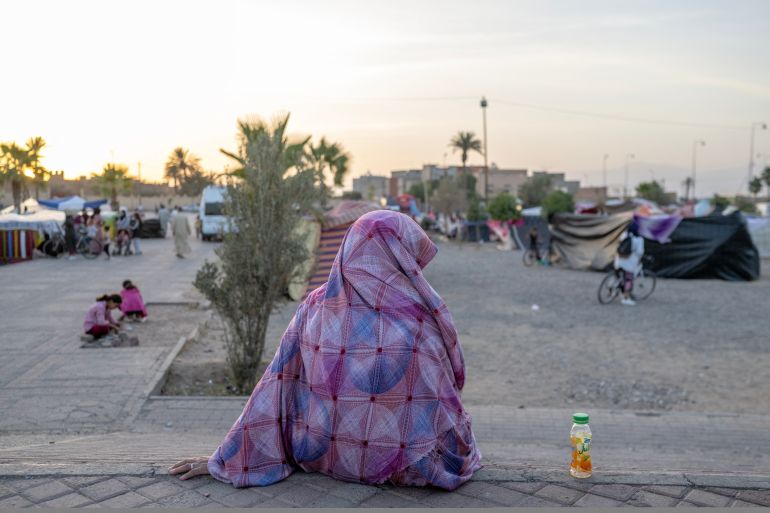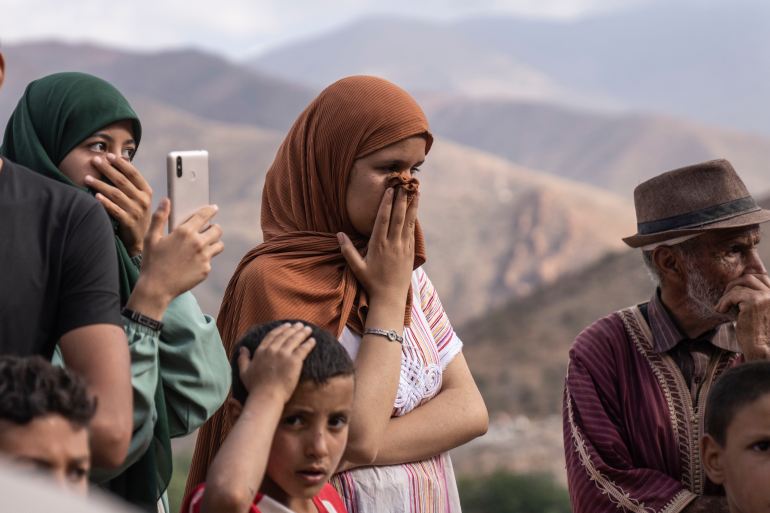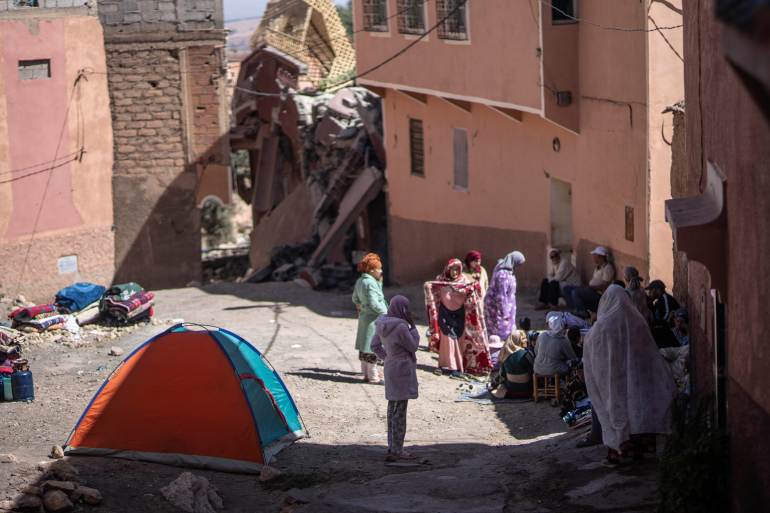Moroccan girls at risk of sexual assault, forced marriage after earthquake
Concerns are rife about trafficking, menstrual hygiene and securing safe childbirth.

A torrent of messages posted online by men promoting the marriage of underage girls and other forms of exploitation following the powerful earthquake in Morrocco has women’s rights activists and organisations on high alert.
Amid the wreckage of the 6.8 magnitude earthquake that hit the Atlas Mountains in Morocco on September 8, an adult man, purportedly a volunteer helping survivors, poses next to a young girl of about 10.
Keep reading
list of 4 items‘Life is finished’: Morocco reels as hopes fade for survivors under rubble
In midst of Morocco earthquake chaos, surprising heroes: Villagers’ donkeys
Tenzirt, a village wiped off the map by Morocco’s earthquake
“She doesn’t want to come with me to [Casablanca] but she whispered that when she grows up we will get married,” the man wrote in a caption to his Instagram story with a photo of himself and the young girl.
Another popular page on Facebook bashed “city girls”.
“Why would you marry someone spoiled who still wants to dress in exposed and tight clothes, spend a lot of money, improperly raise your kids,” the post reads, urging men to instead marry “girls who wouldn’t ask for anything”.
“[Men] have been advocating to go and marry these girls, some of them justifying [their] interpretation of religion … Even if they’re underage, we will save them [they say],” Yasmina Benslimane, a Moroccan activist and the founder of Politics4Her, a nonprofit organisation promoting gender equality in politics, told Al Jazeera.
Benslimane and other Moroccan women’s rights activists had been pushing for the importance of menstrual care in the immediate aftermath of the earthquake when they were soon alerted to the campaign urging Moroccan men to travel to remote villages to “save” young girls.

At least one man was arrested this week for promoting such content, a 20-year-old student from the city of Errachidia who boasted online about travelling to quake-hit zones with the intention of sexually assaulting young girls, according to local media.
The accounts have led to Benslimane and her organisation urging for a gender-sensitive relief response to the earthquake. They have now published a manifesto calling for such a response.
“We knew that something like that would happen, that there will be risks of gender-based violence, that there will be risks of exploitation, and this is exactly what is happening with the alarming cases we’ve seen online,” said Benslimane.
“It’s absolutely crucial to have a gender-sensitive approach to disaster relief,” she added. “According to [the UN Development Programme], women and girls are 14 times more likely to die during disasters than men.”
Wards of the nation
As recovery operations continue, Morocco has paid some attention to the particular risks more vulnerable populations are facing.
Last week, King Mohammed VI conferred “Ward of the Nation” status to the children orphaned by the quake, to “protect them from hazards of all kinds”, including being trafficked, Karima Mkika, president of the Marrakesh-based Al Karam Association, an NGO that works to protect vulnerable children, told Al Jazeera.
Mkika’s organisation has not documented cases of child trafficking occurring following the earthquake, but they have set up a hotline for people to report any such abuse.
According to Laila Baker from the United Nations Population Fund (UNFPA), Morocco has long been working to ensure that combatting gender-based violence and implementing reproductive health measures are core elements of its emergency national preparedness plans.
That’s why, Baker said, the UNFPA’s response to the disaster has not needed to be as robust when compared to its operations in Libya, another North African country reeling from environmental disaster after flooding brought on by a storm last week killed thousands.
“We’re actually much more well-stocked in Libya because there has been an ongoing conflict,” Baker told Al Jazeera.
In Morocco, according to the regional director, there is anecdotal evidence of instances of sexual assault that have taken place following the quake.
But when compared to its operations in Libya, where it has been providing emergency services for over a decade due to the civil strife there, the UNFPA has not had the need to develop such a structured system in Morocco to provide services in such cases, including counselling, she said,
A country’s level of preparedness to respond to the gendered aspects of crises is therefore critical, Baker added.

Period poverty persists
While concerns are rife about possible forced marriages, trafficking and sexual assault, the basic issue of menstrual hygiene persists.
“Women don’t stop having their periods just because there’s an earthquake,” Nora Fitzgerald, from the Marakkesh-based nonprofit Amal Women’s Training Center, told Al Jazeera.
In the hardest-hit mountainous regions, period poverty – or limited access to menstrual products – already existed prior to the quake.
Women and girls in the mountains often do not use throwaway sanitary pads but rather rags, said Fitzgerald.
“But at least they have some privacy and they can wash things and whatnot. So now you can imagine there are not even bathroom facilities,” she said, referring especially to people from remote populations now travelling to urban cities to seek shelter and support.
Organisations campaigning for and procuring menstrual supplies for affected women and girls are therefore providing educational resources as they deliver them.
“[It’s] really important to understand the cultural norms before we donate period products which they might never have seen before, or even know how to use,” said Manjit Gill, the CEO and founder of Binti International, an international charity focused on alleviating period poverty.
Gill’s organisation is therefore providing more reusable menstrual products over disposable ones, mindful of what local women and girls are used to.
The UNFPA is using the opportunity to not only provide information about the menstrual kits they are delivering but to also speak with young girls about their needs, in order to make the process “more human”, said Baker.
‘Babies don’t stop being born’
Meanwhile, as hospitals are filled to the brim with the wounded, and as villages are cut off as a result of the earthquake’s damage, pregnant women face challenges.
According to the UNFPA, at least 4,100 pregnant women have been impacted by the quake.
The UN agency is responding to requests for a mobile clinic and options for safe deliveries.
It also runs a development program in Morocco focused on training midwives, a service that has been essential in many countries, said Baker.
Depending on hospitals can pose a challenge in emergency situations in particular, she said.

That’s especially true in places where there is little to no medical care.
“Babies don’t stop being born [following an earthquake],” said Fitzgerald.
Her organisation received a request from a rural village for a tent and some clean sheets, in order to assemble a makeshift delivery room for women to give birth.
“They literally have nothing,” she said.